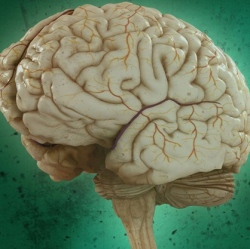
Older adults who took music lessons as children but haven’t actively played an instrument in decades have a faster brain response to a speech sound than individuals who never played an instrument, according to a new study by Northwestern University researchers.
They found that the more years study participants spent playing instruments as youth, the faster their brains responded to a speech sound.
As people grow older, they often experience changes in the brain that compromise hearing. For instance, the brains of older adults show a slower response to fast-changing sounds, which is important for interpreting speech.
For the study, 44 healthy adults, ages 55-76, listened to a synthesized speech syllable (“da”) while researchers measured electrical activity in the auditory brainstem. This region of the brain processes sound and is a hub for cognitive, sensory, and reward information.
The researchers discovered that, despite none of the study participants having played an instrument in nearly 40 years, the participants who completed 4–14 years of music training early in life had the fastest response to the speech sound (on the order of a millisecond faster than those without music training).
